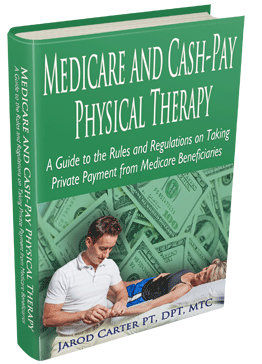After 5 years of research and a year of writing like a madman, the Medicare and Cash-Pay Physical Therapy guidebook is finally available!
Click on the book below to see the long list of everything you will learn in this truly comprehensive guide (for any type of PT practice) on the regulations surrounding private-payment and Medicare beneficiaries.
Or if you’d prefer to read the list on this page, here you go…
You will learn:
- The 3 possible relationships a physical therapist can have with Medicare and how this affects every decision you make surrounding this topic.
- How being a “Non-Participating Provider” is Not the same thing as “Opting Out” of Medicare.
- Why being a “Non-Participating Provider” is Not the same thing as having no relationship with Medicare.
- Why being non-enrolled or un-enrolling in Medicare is also Not the same thing as “opting out” of Medicare.
- The “Mandatory Claims Submission” law and how it affects your ability to provide cash-pay services to Medicare beneficiaries.
- The ONE exception the Mandatory Claims Submission law and how this exception can significantly change your ability to take self-payment from a beneficiary.
- How your specific relationship with Medicare dictates when/if you are able to provide covered services on a self-pay basis.
- The 3 reasons that services are not covered by Medicare.
- The scenarios in which covered services may become non-covered.
- How meeting the Therapy Cap may or may not change our ability to collect self-payment from that beneficiary, and the process that should be followed in doing so.
- The key factors you must know to determine when you can take cash-payment for “Maintenance Care”… sometimes you can and sometimes you can’t.
- How the 2009 HITECH Act and the 2013 HIPAA Omnibus Final Rule may or may not have created opportunities to treat beneficiaries on a cash-pay basis.
- When you should use an Advanced Beneficiary Notice (ABN) versus a Private Contract if you’ll be collecting private payment from beneficiaries.
- The correct process for using an ABN when normally-covered services may no longer be covered due to lack of medical necessity.
- Key information needed for ABN use with patients who have met the Therapy Cap.
- The checklist of “talking points” you’ll need when discussing payment with prospective patients as a Non-Participating provider.
- Crucial points to consider as a non-enrolled provider discussing treatment and payment with prospective Medicare-aged patients.
- The vital rules and regulations surrounding the Pricing of your self-pay services.
- How those pricing rules change based on your relationship with Medicare, whether or not the services are normally covered, and your compliance with PQRS and EMR.
There is ALSO a Bonus 20+page Q&A chapter that answers all the following questions and more!
- How do I differentiate between covered “skilled PT” and non-covered services like “wellness,” “fitness,” and “prevention”? What does a legal cash-pay fitness or wellness program look like?
- What if a patient is only signed up for Medicare Part A and does not have part B or C? Some of my Medicare-aged patients have Part A, but maintain private insurance coverage for their outpatient healthcare (via their un-retired spouse’s work benefits). In this scenario, can we provide outpatient PT services on a private-pay basis?
- If a patient is Medicare-aged but has a private insurance as their Primary insurance, and Medicare as their Secondary insurance, can we see these patients on a private-pay basis just like we do with Non-Medicare patients who are privately insured?
- I am not enrolled in Medicare. I have a prospective patient who is a Medicare beneficiary and is currently getting PT at another clinic, which participates with Medicare. He would like to see me as well on a cash-pay basis to receive more specialized and longer therapy sessions. Is this okay?
- If I drop my provider status and only see Medicare beneficiaries for private-pay services, am I still required to document in the same way I was as an enrolled provider? How do treatment documentation requirements change?
- Can practices have success being out-of-network with all 3rd Party Payors except for Medicare?
- How do I find out if a patient has met the Therapy Cap?
- Am I under the same limitations and regulations for retired military patients with TRICARE coverage, who want to see me on a cash-pay basis?
- Can I change my Medicare Provider status? Exactly how do I do so?
- What is the best provider relationship for me and my practice?
- What about patients with Medicare ADVANTAGE Plans (Part C)? Since they have signed their benefits over to a private insurer can we see them on a private-pay basis as if they were like our Non-Medicare patients?
You no longer have to be confused about this topic. You can stop worrying about getting in trouble with CMS or missing out on cash-pay opportunities with your Medicare patient population. Click the link below to get your copy.
Medicare and Cash-Pay Physical Therapy:
A Guide to the Rules and Regulations on Taking Private Payment from Medicare Beneficiaries
Interested in the cash-based private practice model?
>> Click Here to learn how to start your own Cash-Based Practice <<






